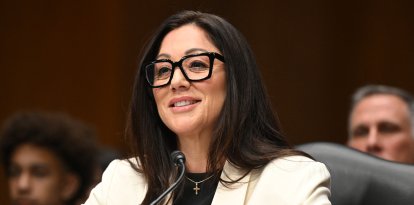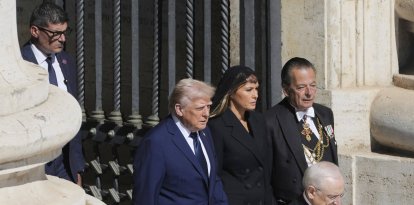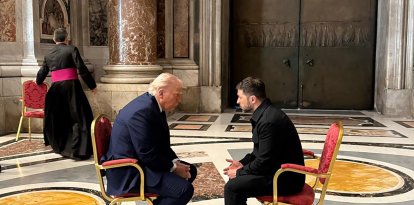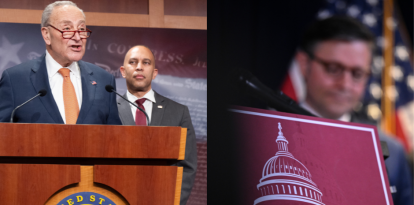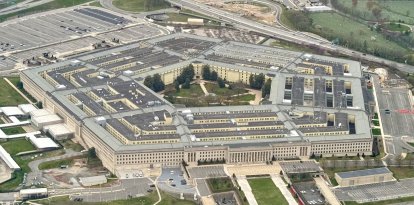He armed Israel, recovered the economy, but idealism defined him: The legacy of the controversial Shimon Peres, one of the architects of modern Israel
September 28 marked seven years since his death in 2016. Throughout his nearly seven decades in public service, he held every position of power in his country and garnered friends and enemies in equal numbers.
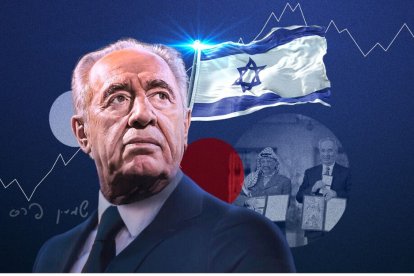
Shimon Peres/Voz Media
Israel was born as a Jewish State in 1948, after the Second World War, and for much of its early years, it went through a difficult socioeconomic situation. Thanks to interventionist governments, which maintained excessive regulations in the economy and had the habit of spending much more than it earned, the country reached 400% inflation in 1984.
This year Israel became one of the richest countries in the world, with a GDP per capita that rivals those of France, Germany and the United Kingdom. Dubbed "the most innovative country in the world " and the "cradle of startups," it promotes a very seductive environment for companies to invest money and develop the most advanced technologies from around the world.
As if that were not enough, today it manages to produce quality food in the middle of a desert. It has the best R&D (research and development) rate in the world, and at the same time, it left inflation in the past. All this with just a little more than 9 million inhabitants.
These advances in such a short time were possible due to a violent change of direction that a prime minister carried out in 1984. That man was Shimon Peres. With almost seven decades in public service, he is considered one of the architects of modern Israel thanks to his role in arming Israel in the nuclear project, economic righting and later during the peace agreements.
He served as Minister of Defense and Foreign Affairs, as Prime Minister in two non-consecutive terms, and then as President.
His figure generated, generates and will generate a lot of controversy. Some find him too contradictory and legend has it that he was more loved outside of his country than inside. On the seventh anniversary of his death, we look back at his legacy.
"Never stop being Jewish"
He was born Shimon Perski on August 2, 1923 in the city of Vishnieva, formerly Poland and today Belarus, when Israel did not yet exist. His greatest influence as a young man was his maternal grandfather, Zvi Meltzer, who instilled religion in his life and gave him advice that he would never forget: "Never stop being Jewish."
In 1934, minutes after hearing those words from his grandfather, he left with his family for the British mandate of Palestine. A few years later the Nazis took Vishnieva, packed the Jews into the modest local synagogue and set it on fire. "I still hear his voice every time someone sings "Kol Nindré." I still feel his spirit every time I face a difficult decision," he recalled in his latest book, "Dream without Limits."
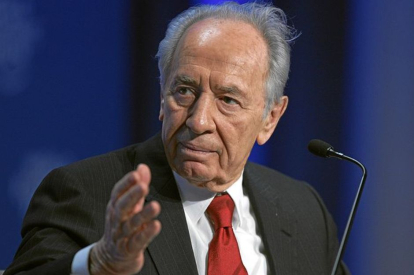
Shimon Peres
Wikimedia Commons
In Tel Aviv, he was part of a youth movement that soon marked his path. One of the leaders recommended that he go to the Ben Shemen Youth Village, an intellectual center of Zionism where young people learned skills, how to work in a community and, of course, defense tactics. There, he was sent to a wooden cabin that he shared with other boys. During the day he trained and at night he stood guard since the Arabs had the annoying habit of shooting at the village and trying to steal its resources.
His eloquent oratory and leadership skills allowed him to stand out and be elected as a delegate to the national convention, to which he traveled with his idol, David Ben-Gurion —who also happened to be one of the most important figures in Zionism and later would lead Israeli politics. Once he reached Government, he held different positions related to defense and international relations.
Rise in Israeli politics
Specifically, it was Ben-Gurion who summoned Peres in 1947 to collect all the bullets and weapons he could, since he sensed that war was imminent once Israeli independence was declared.
His work caused him to develop a close relationship with his idol, causing even older politicians to be suspicious of him because the now prime minister of Israel had placed trust in a boy. "He doesn't lie, he doesn't speak ill of other people, and when he knocks on my door, he usually brings a new idea," Ben-Gurion once said about Peres.
He continued to increase Jewish weaponry, which led him to travel the world, sometimes taking risks. For example, he was once in Colombia testing an airplane he was thinking of buying when the left engine caught fire in mid-flight. "What are our options?" he asked the pilot, who responded that they could make an emergency landing in the jungle or continue flying to Cartagena hoping that the plane would not explode. "I choose the second option," Peres responded.
Nuclear dreams
Convinced that Israel had to enter the nuclear race to deter its enemies, who were not few, he began to negotiate the arrival of a nuclear reactor. With the words of Thomas Hobbes very much in mind, he became convinced that "nuclear reputation is deterrence and deterrence is the first step towards peace."
Turning a deaf ear to criticism within the Israeli government itself, he negotiated with the French to achieve his objective. He convinced Maurice Bourgès-Maunoury, French Prime Minister, to approve the shipment of the reactor. However, before they could put it on paper, the French opposition removed him from office through a vote of no confidence.
The unease was unsurmountable. Peres went to Bourgès-Maunoury's office that morning to console his friend, who had no intention of breaking their agreement.

Shimon Peres - David Ben-Gurion
Wikimedia Commons
"He took a piece of paper from a table that was no longer his and wrote a letter to the president of the Energy Commission. In it, he explained that the French Government had approved the agreement and that the president would have to offer the necessary cooperation to carry it out. He signed it as 'prime minister of France'. At the top of the page he wrote the date of the previous day," Peres recalled in his last book.
This is how the Dimona Project was born, which perhaps increased the anger of Israel's enemies, but, in his own words, "made them distrust their ability to defeat us." Indeed, during the Yom Kippur War of 1973, Egypt and Syria could have advanced on their cities, "but neither country dared to attack the heart of Israel, although they had the capacity to do so. (...) The nuclear deterrent force also gave a possibility to peace," Peres thought.
The unlikely success of Operation Entebbe
In June 1976, a group of terrorists belonging to the Popular Front for the Liberation of Palestine hijacked a plane with 250 passengers. As Minister of Defense, he actively participated in finding a solution. Per usual, his position, that of not negotiating with terrorists, was not echoed.
The Government was quite hostile to his position of not negotiating with the terrorists, who at that point were asking for the release of several colleagues who were imprisoned.
"If we give in to the demands of the kidnappers," he said in one of the turbulent cabinet meetings, "everyone will understand us but will not respect us ."
Determined to find a solution that would also protect the "passengers of the future", he chaired the Fantasy Committee, a group of officials who wanted to find an alternative solution, and they shaped Operation Entebbe, which consisted of invading Uganda (where the captors had landed), taking the airport, defeating the terrorists and rescuing all the hostages by plane.
A few hours of debate with the Prime Minister, Yitzhak Rabin, were enough to convince him to authorize the operation. Its success led it to be a case study throughout the world and to consecrate Israel as "a brave and cunning country, which did not surrender to terrorists and which was committed to universal values."
Israel's economic reinvention
As prime minister, Peres had to face a difficult economic situation, with inflation of 400%. How did he leave it behind? He brought together a large economic table that led him to leave behind the idea of the welfare state.
He controlled government spending, privatized loss-making public companies, froze the salaries of state employees and stopped monetary issuance.
He complemented these measures by signing the independence of the Central Bank, to ensure that other politicians could not go back. As a result, the public deficit went from 15.3% in 1984 to a 2.7% surplus in 1986. In addition, the local currency appreciated against the dollar, acheiving by 2002 that deposits in shekels represented 38%, when he took office that number was 3%.
The Oslo agreements
Perhaps one of the most famous photos in the geopolitical world features Bill Clinton, Yitzhak Rabin and Yasir Arafat, president of the PLO, signing the Oslo Accords. There they established mutual recognition, they agreed to return lands. The path to peace was paved.
Peres was a fundamental part of the secret negotiations that took place in Norway. Legend has it that he even negotiated most of the deal behind Rabin's back, who was not happy about, shaking hands with Arafat, who was responsible for a few terrorist acts.
Naive or idealistic?
Regarding the agreements, there are several experts who doubt their effectiveness, and some claim that they are the origin of the current situation.
Many accused Peres of being a contradictory and even naive figure, given that he was first in charge of arming Israel and then defended the pacifist discourse tooth and nail.
These comings and goings led him to make many enemies throughout his career, in part due to his constant search for peace with the Palestinians, even when they continued to perpetrate terrorist acts.
“Optimism and naivety are not the same thing.” Just because I am an optimist does not mean that I expect peace to emerge from love. I simply hope for a peace that arises from necessity. "I don't imagine a perfect peace, but I do believe that we can find a peace that allows us to live side by side without the threat of violence," he confessed in "Dream without Limits."
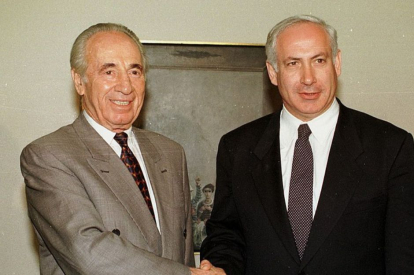
Shimon Peres-Benjamin Netanyahu
Wikimedia Commons
His relationship with Benjamin Netanyahu
They faced each other in the 1996 elections, where Netanyahu managed to defeat the veteran and become the youngest prime minister in the country's history.
Despite their electoral rivalry, the two worked together in the future and cultivated a relationship of respect. For example, although during the day he clashed fiercely with the Knesset, Netanyahu invited him to his residence in Jerusalem at night to consult with him about the prime minister's job: dealing with Arafat, the defense system and strategic geopolitics.
Indeed, after Peres' death, Netanyahu had very affectionate words for his once-political rival and advisor.
"Few people have contributed so much to our town and our state. I met Shimon 40 years ago at the grave of my brother Yoni, who fell while leading his men to rescue our hostages in Entebbe, Uganda. I will never forget the warmth that Shimon showed me, my brother, and my parents in those moments of intense pain. (...) His name will be forever recorded in the history of the rebirth of the Jewish people, as one of our great leaders, as one of the founding fathers of the State of Israel," he expressed and then recalled that that was the first day in the Jewish State without Shimon Peres.
The idealist who never stopped dreaming
Peres passed away on September 28, 2016, just days after speaking with technology entrepreneurs from around the world. As he confessed in the last paragraphs of his last writing, he tried to use his time on earth to “generate a positive impact.”
Always restless, he popularized the phrase “being up to date is not enough”, so you have to “be up to date with tomorrow”.
"I don't have the patience to sit and watch. I want to participate in the march towards the future. I don't like to sit in my chair and wait 10 years for something new to come along. I prefer to run, move, think, surprise myself. Always be optimistic, but never be satisfied. Go ahead, dream", he stated in the final moments of a documentary about his life made by Netflix.
When asked what he regretted in his life, Peres paused for a moment and responded in his usual calm tone: "Simply not having dreamed more ."
RECOMMENDATION
